- Home
- Isuna Hasekura
Spice and Wolf, Vol. 12
Spice and Wolf, Vol. 12 Read online
Copyright
SPICE AND WOLF, Volume 12
ISUNA HASEKURA
Cover art by Jyuu Ayakura
Translation: Paul Starr
This book is a work of fiction. Names, characters, places, and incidents are the product of the author’s imagination or are used fictitiously. Any resemblance to actual events, locales, or persons, living or dead, is coincidental.
OOKAMI TO KOSHINRYO Vol. 12
© ISUNA HASEKURA 2009
Edited by ASCII MEDIA WORKS
First published in Japan in 2009 by KADOKAWA CORPORATION, Tokyo.
English translation rights arranged with KADOKAWA CORPORATION, Tokyo, through Tuttle-Mori Agency, Inc., Tokyo.
English translation © 2014 by Yen Press, LLC
Yen Press, LLC supports the right to free expression and the value of copyright. The purpose of copyright is to encourage writers and artists to produce the creative works that enrich our culture.
The scanning, uploading, and distribution of this book without permission is a theft of the author’s intellectual property. If you would like permission to use material from the book (other than for review purposes), please contact the publisher. Thank you for your support of the author’s rights.
Yen On
1290 Avenue of the Americas
New York, NY 10104
Visit us at yenpress.com
facebook.com/yenpress
twitter.com/yenpress
yenpress.tumblr.com
instagram.com/yenpress
First Yen On eBook Edition: April 2017
Originally published in paperback in August 2014 by Yen On.
Yen On is an imprint of Yen Press, LLC.
The Yen On name and logo are trademarks of Yen Press, LLC.
The publisher is not responsible for websites (or their content) that are not owned by the publisher.
ISBN: 978-0-316-55913-3
E3-20170310-JV-PC
PROLOGUE
Dawn was approaching far across the endless snowy plains. The air was painfully cold, and every breath brought the throb of a headache. The sheep had been let out in the predawn darkness and could be seen at the edge of the horizon.
This scene had repeated itself for centuries and would surely continue to do so for centuries to come—the clear sky; the rolling, snowy hills; and the flock of sheep that trod them.
Lawrence took a breath and then exhaled. The wind carried the vapor away in a swirl, and his eyes followed it as it went.
Beside him, his still-sleepy traveling companion crouched down and poked at the snow with her finger.
“It may be gone, I hear.”
The response to his sudden words was no great thing. “One can hardly lose what one does not already have.” She made a snowball with her small hands and then tossed it away.
It disappeared in the snow with a soft noise, leaving a hole behind.
“We humans can indeed lose again things we’ve lost already.”
Another snowball opened up a second hole before his companion replied to him. “Such reasoning’s beyond the likes of me.”
“Do you imagine things are over when you die? It’s not so. When we die, we either live on in heaven or die yet again in hell. Losing something already lost is not so very difficult.”
His companion decided against making a third snowball and breathed on her cold, red hands. “’Tis dreadful indeed to be a human.”
“It surely is.” Lawrence nodded.
After a moment passed, his companion put another question to him. “How does one lose such a thing?”
“It’s dug up, carved out, with not a trace left behind—or so people say.”
Lawrence heard the sound of rustling fabric and turned to see his companion bent over in laughter.
“Aye, ’tis dreadful to be human! Only a pup could dream up such a notion—I surely never could.” She straightened and was still fully two heads shorter than him.
Just as the adults’ faces he had looked up to as a child always seemed vaguely frightening, the face of any girl he looked down on now always seemed weak and ephemeral. But this girl seemed stouthearted and strong, despite her stature, which was surely no illusion.
“Still, ’tis a bit pleasing to hear as much.”
“…Pleasing?”
“Aye. The first time, I lost what I did utterly unbeknownst to me. It had nothing to do with me, and there was nothing I could do to stop it from happening.”
She took a step, two steps, leaving footprints in the snow, as though to prove the weight of her light-seeming body. The footprints were small but distinct.
“But this time—” The hem of her robe whirled around her, and now the morning sun was to her back as she smiled. “—This time I will be there. ’Twill be my life after death.”
She grinned, and from behind her lips peered her sharp fangs.
“I thought there was nothing I could do, but I have another chance. Such happy things do not often happen. I can act or not as I see fit. Much better that than having the matter settled entirely behind one’s back, don’t you think?”
There were two kinds of strength. One was the strength that came with having something to protect. The other was the strength of having nothing to lose.
“You seem strangely bold,” he teased, the breath puffing whitely from his mouth.
“’Tis because I’ve come upon a wonderful excuse. Regardless of the outcome, I’ll have participated in whatever happens. There’s a certain comfort in that. It might be even more important than whether things go well or not.”
Following her implication to its conclusion suggested that even if she lost out in the end, she might do so without suffering. But when someone seemed to be concealing something and then voiced such a sentiment aloud, one could hardly fail to extend a hand to them.
To lose was one thing, but the challenge of losing with grace was a far more difficult one.
“I must live a good long while yet. I need the hearth of a good excuse to sleep through the cold nights. Something to hold while I sleep that suffices to gaze at when I wake.”
It was a difficult thing to meet such words with a smile, yet he had to. Her fearlessness made it seem as though she was proposing they go and steal the great treasures of the world.
“I can’t stay with you forever. I can only do so much to aid you. But what I can do for you I will.”
She stood there in the snow, the morning sunlight shining down on her small back.
What she wanted to know was not what his stated goal was, but rather what he could actually accomplish. Her heart was a bit too tender to desire passionate proclamations of his willingness to make any effort or risk any danger.
Perhaps their mutual willingness to simply join hands and walk together without going to any great effort only proved that he was getting older. The smile that appeared on her face was a happy one.
“Well, then, perhaps I will use breakfast as an excuse to see just how far you’ll go for me, eh?” Her joke signaled the end of their melancholy conversation. She returned to his side with light, bounding steps, then clung flirtatiously to his arm.
“Just make sure you don’t eat so much that this breakfast becomes your last.”
Even under the best circumstances, the cost of feeding her was no joke. But what had to be taken even more seriously than said cost was the speed of her wit.
“Aye. After all, you love me so much you can hardly bear it—If I ate enough to please you, my belly would surely burst.”
The words that came out of her mouth were a fortress, and if he dared to counterattack, snakes would come slithering out of the grass that surrounded it. Surrender was his only option. He shrugged. “I have no particular des
ire to kill you.”
“Mm.” Her red-tinged amber eyes took in the sight of the snow-covered abbey and then closed. “’Tis well. I’d hate to die by your generosity.”
Lawrence wondered privately if dawn was the coldest time of day as a reminder from God that it would only become warmer from here.
CHAPTER ONE
I’ll call on you later.
Merchants rarely had the luxury of interpreting those words literally. Sometimes it meant perhaps if we’re lucky, we’ll talk, but it could easily be a year or even two before coincidence allowed the promise to be made good upon.
However, when the words came from someone connected to a large economic alliance, they could be taken at face value. As Lawrence and company were on their way back from the great abbey of Brondel in the middle of the snowy plains, bound for the port where they would return to the mainland, they stopped at the same tavern they had used on the way in, and there they received a letter.
The letter came from Piasky, who had expended such effort during the turmoil surrounding the abbey, and it concerned that same abbey, which had attempted in vain to quickly reverse its own failing fortunes.
Long ago the abbey had produced many great saints, but it was tales of a certain holy relic that brought attention to it now.
The probability that the relic was pagan in nature was very high, as was the probability that it was real.
From the perspective of a traveling merchant like Lawrence, such stories belonged in taverns, told over wine. And yet by strange circumstance here he was, reading secret communications from the Ruvik Alliance concerning the great monastery. The Ruvik Alliance, which owned countless trading ships and held sway over even bishops and kings!
He had to laugh.
And yet upon reflection, Lawrence realized that no matter how vast their influence, such alliances were still made of people. And if during one’s travels one met a kindred spirit in even a lowly servant, it was worthy of a feast.
The meetings and encounters of humanity were arranged by God, so any number of mysterious things might happen. After all, by any normal standards, the idea of having the companion he did was utterly laughable, but there she was, standing next to him and peering curiously at the letter.
Her hair was chestnut, her chin fine. Her red-tinged amber eyes and her elegant lips. And if her noble beauty was rare, still rarer were the wolf ears beneath her hood. Lawrence’s serendipitous traveling companion Holo was neither noble nor human. Her true form was that of a great wolf large enough to devour a man in a single bite, a being from the age of spirits, where she once dwelled within the wheat and ensured its bountiful harvest.
Of course, she herself hated such grandiose descriptions, and as she impatiently swatted his legs with her swishing tail in an effort to hurry his letter reading, the term charming seemed much more appropriate than awe inspiring.
“When you’re done reading, give it back.” He held the letter out to Holo, who snatched it away. The holy relic that Brondel Abbey was said to have purchased was a bone from a great wolf, one far from ordinary—a god. In fact, it was a fake, and the letter described the details of its purchase.
Holo had thought the bone might have belonged to one of her pack.
The relief that came when such worries were dispelled was brief. Since at Brondel Abbey, Lawrence had heard another fell rumor surrounding the wolf bone. The letter offered a clue regarding exactly that.
“Still, to think such a great abbey might be swindled so!” said the third member of their party, Col, as he tended the fire.
He looked younger even than Holo appeared, owing partially to the scrawniness brought on by hard, hungry travel. Either that or it was thanks to his humility, which kept him ever humble despite his clever mind.
Lawrence faced the fire. “Who do you suppose would buy a rusty sword?” This was the sort of thing his master had often done when Lawrence was an apprentice—judging the ability of others by asking them an absurd question.
“Er…someone without any…money?”
“Yes. But who else?”
“Someone with too much money—’tis it not so?” said Holo before Col could answer. Evidently she had finished reading the letter.
She sat down between Col and Lawrence and handed the letter to Col. The young, wandering scholar was himself from a pagan town in the north and believed in the gods’ existence and so was seeking the truth of the wolf bone for himself.
“Indeed. Those with too much money would buy a rusty sword. Even if it’s entirely lost its edge. Such a sword’s value is determined in other ways.”
“So you’re saying that the abbey didn’t care whether the bone was real or not?”
The reward for his excellent answer was a pat on the head from Holo. He seemed entirely happy, without so much as a trace of embarrassment. So happy, in fact, that even the giver of his reward seemed pleased.
“What’s more important than who was deceived by whom is whether or not the abbey was able to give the bone sufficient value. And it seems they were.”
At Lawrence’s words, Col looked down at the letter he had been handed. There was written the only faint possibility of salvation that remained for the abbey.
“It says they were approached by an overseas merchant company with an offer to buy…that’s that company, right?”
Col was speaking of the commotion that surrounded the narwhal back in the port town of Kerube. The Jean Company had been at the center of things and had secretly set aside funds to buy the wolf bone.
“They wanted to sell the bone to the Jean Company for a fortune, then whether or not it was real, feign ignorance. But it didn’t work.”
“And none of that has anything to do with us,” said Holo as she roasted a bit of cheese over the fire on a small stick. She popped the bubbling stuff into her mouth, and beneath her hood, her ears pricked up.
“Quite so. Our attention is elsewhere.”
At Lawrence’s words, Col returned his gaze to the letter. Had it contained anything truly important, it would not be in its conveyance of the facts. Baseless impressions could be very valuable from time to time.
When it came to information that was truly valuable for trading, it would not be had in the letter’s contents. What was valuable was that which no one knew, and such secrets came from wild conjecture, not hard proof.
“‘It seems such trades have been made all over in recent years. I suspect those at their center have a very different information network than we possess. It seems to be the north has become unstable. God’s protection be upon us all. Piasky.’”
Holo finished chewing her cheese and tossed the stick into the fire. “That agrees with what we heard from old Huskins, does it not?”
Holo generally avoided using people’s names, but the name she deigned to utter was that of the true identity of the legendary golden sheep of Brondel Abbey. But it was not simply because Huskins was a similar being to her that she spoke his name. She was an obstinate wisewolf, and if she did not respect someone, she would not spare them more than a this or a that.
“The Jean Company that approached the abbey to purchase the bone was originally a branch of the Debau Company, Mr. Huskins told me. He said that the situation in the north was going to change dramatically based on the interference of the company that owns mines in the region—and that’s none other than the Debau Company, a group that has a web of influence quite separate from the Ruvik Alliance.”
Huskins had secretly created a home for himself and his kind on the lands of Brondel Abbey in the kingdom of Winfiel. His comrades wandered the land, occasionally returning to exchange tales of what they had heard and seen. Huskins had given Lawrence some of that information—including something regarding their destination, Holo’s homelands of Yoitsu, reportedly destroyed centuries earlier.
“So the real bone is already in the hands of the Debau Company?”
“That is a possibility. If it’s already on the market, it’s even likelier.�
��
Lawrence took the letter back from Col and then tore it up slowly and deliberately.
“Ah—”
Ignoring Col’s exclamation and look of shock, Lawrence finished tearing the letter into small pieces and then tossed them into the fire.
“A single paper letter is easily destroyed in water or fire. You use parchment if you want to avoid that, but then disposing of it becomes difficult. Easily destroyed paper is used when writing something secret.”
The paper quickly became ash, borne up on the air warmed by the campfire.
“So, what shall we do then, eh?” asked Holo. Both she and Col watched the ash rise into the air, but only Col’s gaze was truly on the ash. Holo’s amber eyes were gazing at something else.
“Mr. Piasky’s letter reinforces what Mr. Huskins told us of the north. Two separate information sources have brought us a similar story. We can safely assume it to be mostly true.”
“So this so-and-so company is really driving people from their homes in order to dig up the mountains?”
Col’s gaze snapped down from the flying ash.
“Hence the possibility that they’re frantically gathering up holy relics without much concern for their authenticity, Mr. Huskins said. Their goal is clear—if you’re going to rely upon force of arms, there’s no stronger ally than the Church. The Debau Company will certainly try to get the Church on its side. It will let them talk about their annexing the land containing the mines in much more favorable terms.”
The campfire crackled quietly.
“A holy war, then. To take back God’s land from pagan hands.”
Holy relics belonged to the religious world. So the wolf bone that Lawrence and company were chasing, too, would probably be used in Church propaganda, Lawrence thought. If it was from a pagan god, then they would deliberately desecrate it, and when divine punishment failed to arrive, call it proof of the Church’s superiority. Holo had said that no matter how strong her kind might be, they couldn’t bite once they’d become bones.
In regions where the breath of the pagan gods still clearly lingered, the reaction would be profound. And if the Debau Company was ready to instigate violence in service of their mining plans, their plans had nothing to do with religious faith and everything to do with profit.

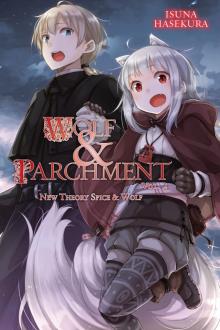 Wolf & Parchment, Volume 2
Wolf & Parchment, Volume 2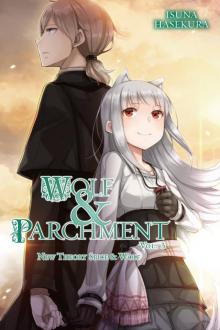 Wolf & Parchment, Volume 3
Wolf & Parchment, Volume 3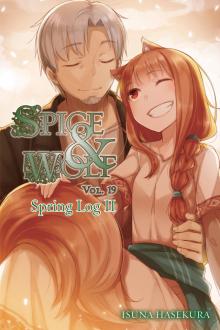 Spring Log II
Spring Log II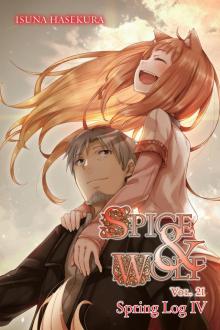 Spring Log IV
Spring Log IV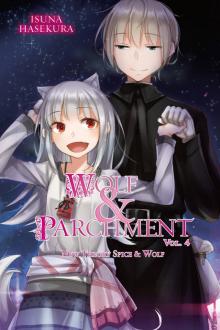 Wolf & Parchment: New Theory Spice & Wolf, Vol. 4
Wolf & Parchment: New Theory Spice & Wolf, Vol. 4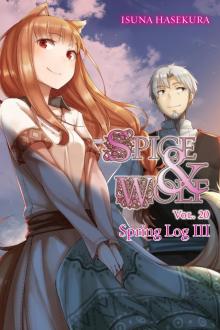 Spring Log III
Spring Log III Spice & Wolf IV
Spice & Wolf IV Spice & Wolf X (DWT)
Spice & Wolf X (DWT)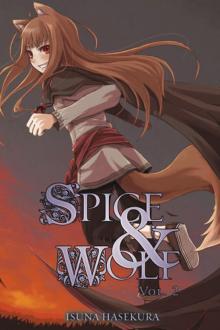 Spice and Wolf Vol. 2
Spice and Wolf Vol. 2 Spice & Wolf XIII (DWT)
Spice & Wolf XIII (DWT)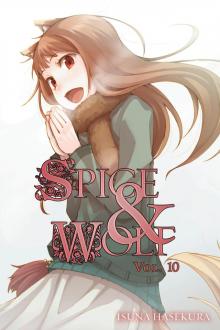 Spice and Wolf, Vol. 10
Spice and Wolf, Vol. 10 Spice & Wolf XVI (DWT)
Spice & Wolf XVI (DWT)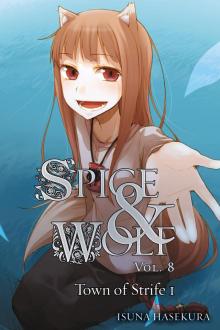 Town of Strife I
Town of Strife I Spice and Wolf, Vol. 5
Spice and Wolf, Vol. 5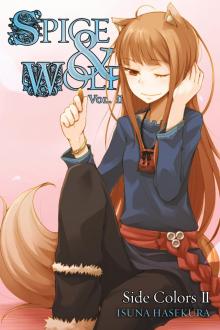 Side Colors II
Side Colors II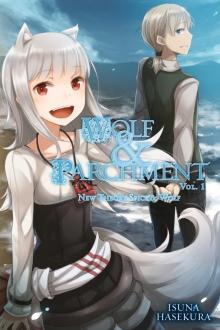 Wolf & Parchment, Volume 1
Wolf & Parchment, Volume 1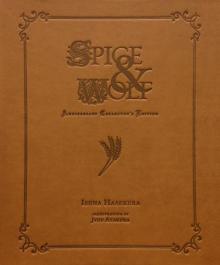 Spice & Wolf Omnibus
Spice & Wolf Omnibus Spice & Wolf XII (DWT)
Spice & Wolf XII (DWT)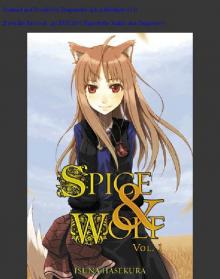 spice & wolf v3
spice & wolf v3 Spice & Wolf
Spice & Wolf Spice & Wolf VIII (DWT)
Spice & Wolf VIII (DWT)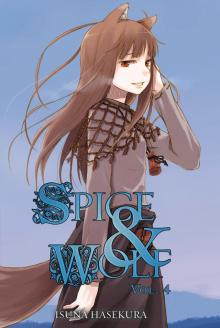 Spice and Wolf, Vol. 4
Spice and Wolf, Vol. 4 Spice & Wolf XIV (DWT)
Spice & Wolf XIV (DWT) Spring Log
Spring Log Spice & Wolf III
Spice & Wolf III Spice & Wolf VII - Side Colors
Spice & Wolf VII - Side Colors Spice & Wolf XV (DWT)
Spice & Wolf XV (DWT) Side Colors
Side Colors Side Colors III
Side Colors III Spice & Wolf VI
Spice & Wolf VI Spice & Wolf IX (DWT)
Spice & Wolf IX (DWT) Spice & Wolf V
Spice & Wolf V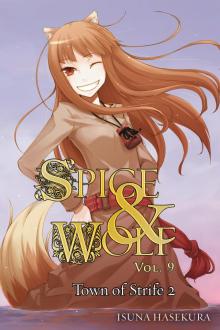 Town of Strife II
Town of Strife II Spice & Wolf XI (DWT)
Spice & Wolf XI (DWT) Spice and Wolf, Vol. 12
Spice and Wolf, Vol. 12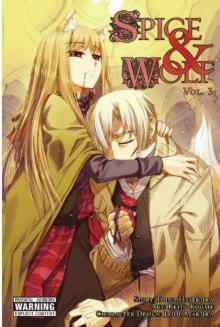 Spice and Wolf, Vol. 3
Spice and Wolf, Vol. 3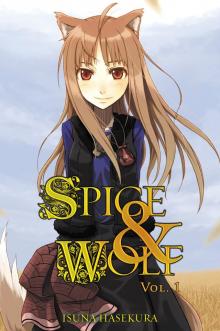 Spice and Wolf, Vol. 1
Spice and Wolf, Vol. 1 Spice & Wolf XVII (DWT)
Spice & Wolf XVII (DWT) Spice and Wolf, Vol. 6
Spice and Wolf, Vol. 6 Spice & Wolf II
Spice & Wolf II